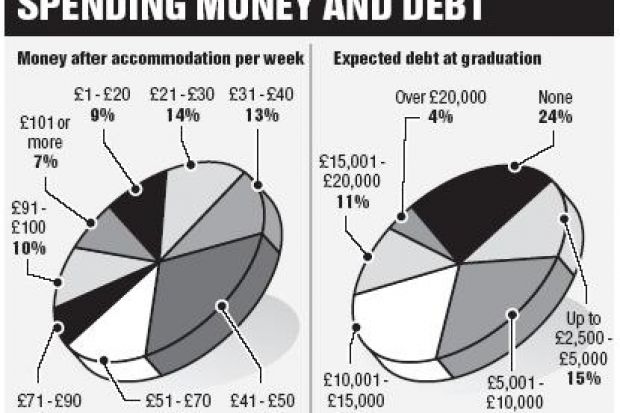The Sodexho- Times Higher University Lifestyle survey shows money worries preying on an increasingly sober lot of students. Anna Fazackerley reports
Students of law may expect to rake in the cash after they graduate, but they will have to eat a lot of baked beans first, according to the results of a new survey.
The Sodexho- Times Higher University Lifestyle survey found that those studying for law degrees were most likely to have a very low weekly budget on which to live.
Almost three out of ten law students (29 per cent) had £30 or less to survive on each week after they paid for accommodation. This puts them at the bottom of the league table when it comes to the size of student wallets.
Those studying maths and computing are similarly hard up - per cent of them have £30 or less to live on each week.
Meanwhile, contrary to their socks-and-sandals image, social scientists have the most cash to flash on campus. More than two out of ten social science students (22 per cent) said they had £91 or more to spend each week - a higher proportion than for any other subject.
The overall average weekly budget for students is £61.26.
But a sizeable proportion of students have much less to spend once they have paid their rent bills. Most worryingly, one in ten students (10 per cent) survives on less than £20 a week. This percentage has grown from the 8 per cent reported in our survey two years ago.
A further 14 per cent of students had a weekly budget of between £21 and £30. Tim Farron, MP for Westmorland and Lonsdale and the Liberal Democrat Spokesperson for Higher Education, said: "I am extremely concerned by these results. If you had pensioners existing on less than £20 a week, there would be an outcry."
He added: "There is a sense that students don't matter - that this sort of debt is character-building. But it can impact on people's ability to get the degree they are capable of, as well as making them flipping miserable."
He also warned that stories of financial deprivation would lead young people from lower socioeconomic groups to give up any thoughts of attending university.
However, not all students are strapped for cash. At the top end of the scale, 10 per cent of students said they have between £91 and £101 to spend every week, and 6 per cent have between £101 and £200 at their disposal.
A fortunate minority of 2 per cent of students have more than £200 to fritter away each week in between studying.
'My business stands me in good stead,' says £720-a-week student
David Warren, final-year business modelling and management student at Sheffield Hallam University, says that work is in his blood.
He has had jobs since he was 16 and now runs his own web-design business while finishing his degree and working for the local council.
He will leave Sheffield Hallam without debt even though he is one of eight children and his parents could not pay his way through university.
He works about 30 hours a week for the council and in his web business, and earns up to £720 a week. He thinks he will have about £16,000 of student loans outstanding on graduation, has an average overdraft of about £500 and average credit cards debts of about £100, but will be able to pay them off when he leaves university with the money he has saved.
He said: "I have a friend who did politics, philosophy and economics at Oxford University who got a 2:1 and didn't walk into a job. He had never worked a day in his life. Doing my business and my job stands me in good stead."
Tessa Henwood graduated in hospitality and business management from Sheffield Hallam University. She also managed to get through her degree in the black. She earned £10,000 during a one-year work placement at the university's enterprise unit as part of her course.
She put her student loan in a tax-free ISA so the interest it earned outstripped the interest on the loan and she learnt bookkeeping.
"I keep accounts now and look at what is going out and coming in," she said.
She did a personal trainer qualification and worked about 30 to 40 hours a week in the university gym, earning about £200 a week. Her studies didn't suffer, as her first-class degree shows.
She usually began studying at 8am and stopped between 3.30pm and 5pm, before going to work until about 10pm. She also worked at the weekend. Her social life suffered a little, but she said: "A lot of my friends work and train in the gym so I saw them when I was working."
She is not afraid of debt but said her family instilled a strong work ethic in her. She will spend some of her loan on travelling.
Register to continue
Why register?
- Registration is free and only takes a moment
- Once registered, you can read 3 articles a month
- Sign up for our newsletter
Subscribe
Or subscribe for unlimited access to:
- Unlimited access to news, views, insights & reviews
- Digital editions
- Digital access to THE’s university and college rankings analysis
Already registered or a current subscriber?
